介词用法 口诀
介词用法口诀大全
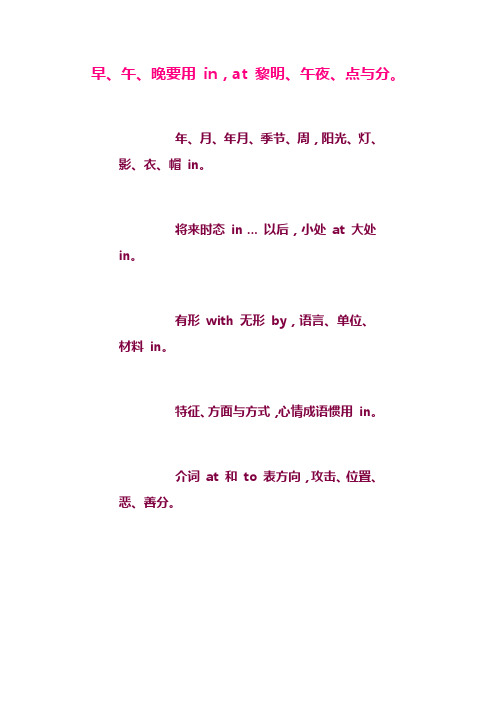
早、午、晚要用 in,at 黎明、午夜、点与分。
年、月、年月、季节、周,阳光、灯、影、衣、帽 in。
将来时态 in ... 以后,小处 at 大处in。
有形 with 无形 by,语言、单位、材料in。
特征、方面与方式,心情成语惯用 in。
介词 at 和 to 表方向,攻击、位置、恶、善分。
日子、日期、年月日,星期加上早、午、晚,收音、农场、值日 on,关于、基础、靠、著论。
着、罢、出售、偷、公、假,故意、支付、相反,准。
特定时日和“一……就”,on 后常接动名词。
年、月、日加早、午、晚,of 之前 on 代in。
步行、驴、马、玩笑 on,cab,carriage 则用 in。
at 山脚、门口、在当前,速、温、日落、价、核心。
工具、和、同随 with,具有、独立、就、原因。
就……来说宾译主,对、有、方状、表细分。
海、陆、空、车、偶、被 by,单数、人类 know to man。
this、that、tomorrow,yesterday,next、last、one。
真的不掉线吗??、????????????接年、月、季、星期、周,介词省略已习惯。
over、under 正上下,above、below 则不然,若与数量词连用,混合使用亦无关。
beyond 超出、无、不能,against 靠着,对与反。
besides,except 分内外,among 之内along 沿。
同类比较 except,加 for 异类记心间。
原状 because of, owing to,due to 表语形容词。
Under 后接修、建中,of,from 物、化分。
Before,after 表一点, ago,later 表一段。
before 能接完成时,ago 过去极有限。
since 以来 during 间,since 时态多变换。
与之相比 beside,除了 last but one。
复不定 for、找、价、原,对、给、段、去、为、作、赞。
介词的使用方法口诀

介词的使用方法口诀介词是连接名词、代词或动词与其他词语的一种虚词,它在句子中起着非常重要的作用。
正确使用介词不仅可以使语言表达更加准确,而且还可以增强语言的表达能力。
下面就介绍一下介词的使用方法口诀,希望能帮助大家更好地掌握介词的用法。
一、表示地点的介词。
1. in,表示在某个范围内或大的地点,如in the room(在房间里)、in China (在中国)。
2. on,表示在某个表面或小的地点,如on the table(在桌子上)、on the wall (在墙上)。
3. at,表示在某个具体的地点或场所,如at home(在家)、at the station(在车站)。
二、表示时间的介词。
1. in,表示在某个时间段内,如in the morning(在早晨)、in July(在七月份)。
2. on,表示在某一天或日期,如on Monday(在星期一)、on January 1st(在1月1日)。
3. at,表示在某个具体的时间点,如at 3 o'clock(在3点钟)、at noon(在中午)。
三、表示原因的介词。
1. because of,表示由于,引起某种原因,如because of the rain(因为下雨)。
2. due to,表示由于,常用于正式场合,如due to the bad weather(由于恶劣的天气)。
四、表示方式的介词。
1. by,表示通过某种方式或手段,如by bus(乘坐公交车)、by email(通过电子邮件)。
2. with,表示伴随或使用某种方式,如with a smile(带着微笑)、with great care(非常小心地)。
五、表示比较的介词。
1. than,用于比较级句式中,表示比较的对象,如taller than me(比我高)。
2. as,用于肯定句中,表示与某人或某物相同,如as tall as me(和我一样高)。
六、其他常用介词。
英语介词用法口诀大全

英语介词用法口诀大全
1. In, on, at 常与时间连,时间地点兼备用。
2. From, to, until, till 时间区间好表示,时间段也可大显神通。
3. By, with, from, of 用于表现方式,类别性介词很不错。
4. Of, for, to 用于表目的,句子结构会媲美。
5. About, with, by 用于表同伴,主谓间隔并不遥远。
6. To, with, without 用于表伴随,进行中卖力才是王道。
7. In, to, on, at 用于表示空间,位置与方向齐心助阵。
8. From, between, among 分别表起点、间隔和混杂,还可表格局不一并掌握。
9. Of, in, about 用于表品质,为句子增色不在话下。
10. About, on, with 用于表主题,内容丰富不含糊。
11. In, on, at 用于表时刻,具体程度可考虑。
12. By, of, with 用于表方式,越具体越考验。
介词用法大全
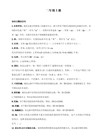
I live in a great city (big city), my sister lives at a small town while my parents live at a village. 我住在大城市,我姐姐住在一个小城镇,而我的父母则住在农村。
at midnight 在午夜
以上短语都不用冠词
at six o'clock 在6点钟
at 7:30 (seven thirty) 在7点半
at half past eleven 在11点半
at nine fifteen 在9点15 分
at ten thirty a.m. 在上午10点30分也可以写成 seven to five 5点差7分(半小时以上)
in fun (jest、joke) 玩笑地
in hesitation 犹豫不决
in wonder 在惊奇中
in public (secret) 公开他(秘密地)
in a good humour 心情(情绪)好
“介词 at、to 表方向,攻击、位置、善、恶、分”
介词 at 和 to 都可以表示方向; 用 at 表示方向时,侧重于攻击的目标,往往表示恶意;用to 表示方向时,突出运动的位置或动作的对象,侧重表示善意。
Many who came in despair went away in hope. 许多人带着绝望情绪而来,却满怀希望而去。
The house was in ruins. 这房屋成了废墟。
The poor girl was in tears. 这个贫苦女孩泪流满面。
Her clothes were in rags. 她的衣服穿破了。
介词用法口诀大全

• 年、月、年月、季节、周 • 即在“某年”,在“某月”,在“某年某月” (但在某年某月某日则用 on),在四季,在第几周 等都要用 in。 • 例: in 1986 在1986 年 • in July, l983 1983年7月 • in spring 在春季 • in summer 在夏季 • in autumn 在秋季 • in winter 在冬季 • in the third week 在第三周
• 将来时态 in … 以后 • 例: They will come back in 10 days. 他们将 10天以后回来。 • After … (从过去开始) • After I had a rest, I went home.
• • • • •
特征、方面与方式、心情、成语惯用 in in power 执政 in a coma 处于昏迷状态 in despair 绝望 in ruins成了废墟 in tears泪流满面 in study在学习上 in all 总计 in advance 事前 in the meantime 与此同时 in place 适当地 in hopes of(或 in the hope of) 怀着……希望 in connection with 和……有关 in contact with 和……联系 in addition to 除……以外 in case of 倘若,万一 in conflict with 和……冲突 in the least 一点,丝毫 in the opinion of 据……见解 in public (secret) 公开地(秘密地) • in a good mood 心情(情绪)好
• “介词 at、to 表方向,攻击、位置、善、恶、 分”。 • 介词 at 和 to 都可以表示方向; 用 at 表示方 向时,侧重于攻击的目标,往往表示恶意;用 to 表示方向时,突出运动的位置或动作的对 象,侧重表示善意。试比较下列各句: • A.He shouted at the old man. 他大声喝斥 那老人。 • B. He shouted to the old man. 他大声向那 老人说。
介词的使用方法口诀
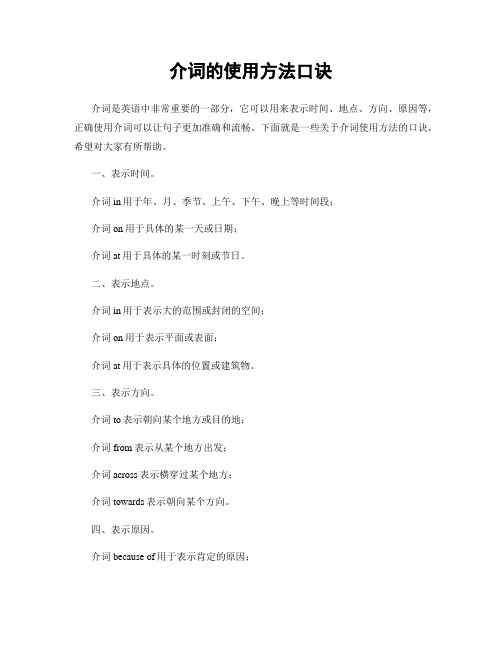
介词的使用方法口诀介词是英语中非常重要的一部分,它可以用来表示时间、地点、方向、原因等,正确使用介词可以让句子更加准确和流畅。
下面就是一些关于介词使用方法的口诀,希望对大家有所帮助。
一、表示时间。
介词in用于年、月、季节、上午、下午、晚上等时间段;介词on用于具体的某一天或日期;介词at用于具体的某一时刻或节日。
二、表示地点。
介词in用于表示大的范围或封闭的空间;介词on用于表示平面或表面;介词at用于表示具体的位置或建筑物。
三、表示方向。
介词to表示朝向某个地方或目的地;介词from表示从某个地方出发;介词across表示横穿过某个地方;介词towards表示朝向某个方向。
四、表示原因。
介词because of用于表示肯定的原因;介词due to用于表示中性的原因;介词owing to用于表示正式的原因;介词thanks to用于表示积极的原因。
五、其他常用介词。
介词by表示通过某种方式或工具;介词with表示伴随或使用某物;介词for表示为了某种目的或代表某人。
六、特殊用法。
介词in、on、at在特定搭配中有特殊用法,需要根据具体情况进行记忆和理解。
七、总结。
介词的使用方法口诀并非一成不变,需要根据具体语境进行灵活运用。
通过大量的阅读和实践,逐渐掌握介词的用法是非常重要的。
以上就是介词的使用方法口诀,希望对大家有所帮助。
在学习英语的过程中,多多积累、多多练习,相信大家一定能够掌握好介词的使用方法,写出更加地道和流畅的英语句子。
介词 动词的用法口诀

介词动词的用法口诀在英语学习中,介词和动词的用法常常让学习者感到困惑。
掌握它们的正确用法对于准确表达意思至关重要。
为了帮助大家更好地理解和运用介词和动词,下面为大家总结了一些实用的用法口诀。
“介词用法口诀”时间介词 at、in 与 on,用法各不同要记清。
at 用于时刻前,“几点几分”很分明。
in 用于上午下午晚,还有年月季与世纪。
on 用于具体某一天,星期节日和日期。
地点介词 at、in 与 on,位置关系要分明。
at 用于小地点,门口车站和学校。
in 用于大地点,城市国家和地区。
on 用于表面接触,街道楼层和页面。
方位介词 above、below、over 与 under,上下位置要记牢。
above 在上方,below 在下方,不接触。
over 在正上方,under 在正下方,有接触。
between 与 among,两者之中有区分。
between 两者之间,among 三者或以上之中。
with 和 without,有无相伴要分清。
with 表示伴随有,without 表示没有无。
“动词用法口诀”动词时态要记清,一般现在常发生。
主语三单加 s/es,其他人称用原形。
现在进行 be doing,be 随人称要变形。
过去进行 was/were doing,动作正在过去行。
一般过去很简单,动词过去式来体现。
规则动词加 ed,不规则的要记全。
将来时态 will do,be going to 也常见。
计划打算用 be going to,单纯预测用 will。
完成时态 have/has done,过去动作影响到现在。
过去完成 had done,过去之前已完成。
被动语态 be +过去分词,动作承受要认清。
使役动词 let、make、have,用法有别要留意。
let 和 make 后用原形,have 可接三种形。
感官动词 see、hear、watch 等,后接宾语加原形或 doing。
看到全过程用原形,正在进行用 doing。
介词用法口诀速记

介词用法口诀速记
1. “in 年 in 月 in 季节,上午下午也用它”!嘿,你看啊,咱就说
“In 2023,in July,in summer”,是不是很清楚呀!
2. “on 加具体某一天,星期节日也包含”!哎呀呀,“on
Monday”“on Christmas Day”,这多好记呀!
3. “at 加时间点,中午夜里和黎明”!可不是嘛,“at 6 o'clock”“at midnight”“at dawn”,一用就明白啦!
4. “for 加时间段,表示历经多少时”!比如说“for three hours”,这一下就懂了吧!
5. “since 接时间点,自从那时到如今”!像“since 2020”,这不就记住啦!
6. “by 截止到某天,务必记住别混淆”!“by Friday”,千万可别搞错呀!
7. “in 在里面 on 在上,at 就把点来放”!多形象呀,只要记住这个,介
词用法就难不倒你啦!
总之呢,介词用法不难记,只要多练习多运用,你就会超级熟练啦!。
常用介词及用法顺口溜
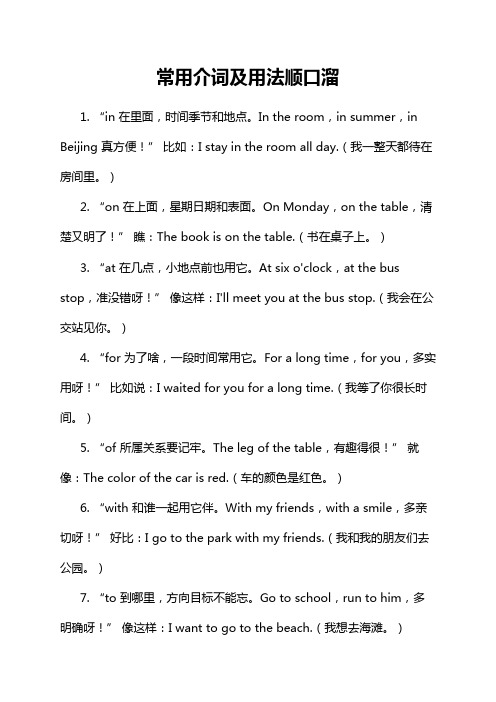
常用介词及用法顺口溜1. “in 在里面,时间季节和地点。
In the room,in summer,in Beijing 真方便!” 比如:I stay in the room all day.(我一整天都待在房间里。
)2. “on 在上面,星期日期和表面。
On Monday,on the table,清楚又明了!” 瞧:The book is on the table.(书在桌子上。
)3. “at 在几点,小地点前也用它。
At six o'clock,at the bus stop,准没错呀!” 像这样:I'll meet you at the bus stop.(我会在公交站见你。
)4. “for 为了啥,一段时间常用它。
For a long time,for you,多实用呀!” 比如说:I waited for you for a long time.(我等了你很长时间。
)5. “of 所属关系要记牢。
The leg of the table,有趣得很!” 就像:The color of the car is red.(车的颜色是红色。
)6. “with 和谁一起用它伴。
With my friends,with a smile,多亲切呀!” 好比:I go to the park with my friends.(我和我的朋友们去公园。
)7. “to 到哪里,方向目标不能忘。
Go to school,run to him,多明确呀!” 像这样:I want to go to the beach.(我想去海滩。
)8. “from 从哪里,来源起始分得清。
From Beijing,from morning,真简单呀!” 例如:He comes from Shanghai.(他来自上海。
)9. “by 靠什么,方式手段用得妙。
By bike,by hand,多形象呀!” 可以说:I go to work by bike.(我骑自行车去上班。
介词用法口诀顺口溜

介词用法口诀顺口溜
1. “in 里 on 上 at 点”,哎呀,你看咱说 in the classroom(在教室里),那就是在里面呀;on the table(在桌子上),不就是在上面嘛;at seven o'clock(在七点钟),就是指那个具体的点呀!
2. “时间前面要用at”,你想想 at night(在晚上),at noon(在中午),是不是很清楚呀!
3. “年月周前要用in”,in 2023(在 2023 年),in May(在五月),in
a week(在一周内),这多好记呀!
4. “日子前面却用on”,on Monday(在星期一),on June 1st(在六
月一日),这不是很简单嘛,嘿嘿!
5. “越过穿过要用through”,就像 through the forest(穿过森林),
多形象呀!
6. “沿着顺着走用along”,walk along the street(沿着街道走),是不是一下子就懂啦!
7. “在……之间用between”,between you and me(在你和我之间),很好理解吧!
8. “在……之中用among”,among the students(在学生们之中),哇塞,这不难吧!
9. “关于谈到用about”,talk about the movie(谈论关于那部电影),这很常用哦!
我的观点结论就是:这些介词用法口诀顺口溜真的超有用,大家一定要记住呀!。
介词使用方法归纳
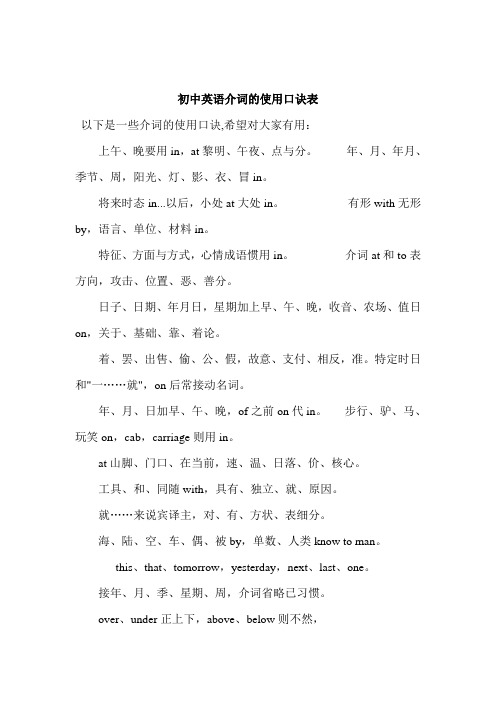
初中英语介词的使用口诀表以下是一些介词的使用口诀,希望对大家有用:上午、晚要用in,at黎明、午夜、点与分。
年、月、年月、季节、周,阳光、灯、影、衣、冒in。
将来时态in...以后,小处at大处in。
有形with无形by,语言、单位、材料in。
特征、方面与方式,心情成语惯用in。
介词at和to表方向,攻击、位置、恶、善分。
日子、日期、年月日,星期加上早、午、晚,收音、农场、值日on,关于、基础、靠、着论。
着、罢、出售、偷、公、假,故意、支付、相反,准。
特定时日和"一……就",on后常接动名词。
年、月、日加早、午、晚,of之前on代in。
步行、驴、马、玩笑on,cab,carriage则用in。
at山脚、门口、在当前,速、温、日落、价、核心。
工具、和、同随with,具有、独立、就、原因。
就……来说宾译主,对、有、方状、表细分。
海、陆、空、车、偶、被by,单数、人类know to man。
this、that、tomorrow,yesterday,next、last、one。
接年、月、季、星期、周,介词省略已习惯。
over、under正上下,above、below则不然,若与数量词连用,混合使用亦无关。
beyond超出、无、不能,against靠着,对与反。
besides,except分内外,among之内along沿。
同类比较except,加for异类记心间。
原状because of,、owing to、due to表语形容词under后接修、建中,of、from物、化分。
before、after表一点, ago、later表一段。
before能接完成时,ago过去极有限。
since以来during间,since时态多变换。
与之相比beside,除了last but one。
复不定for、找、价、原,对、给、段、去、为、作、赞。
快到、对、向towards,工、学、军、城、北、上、南。
介词的用法记忆口诀顺口溜
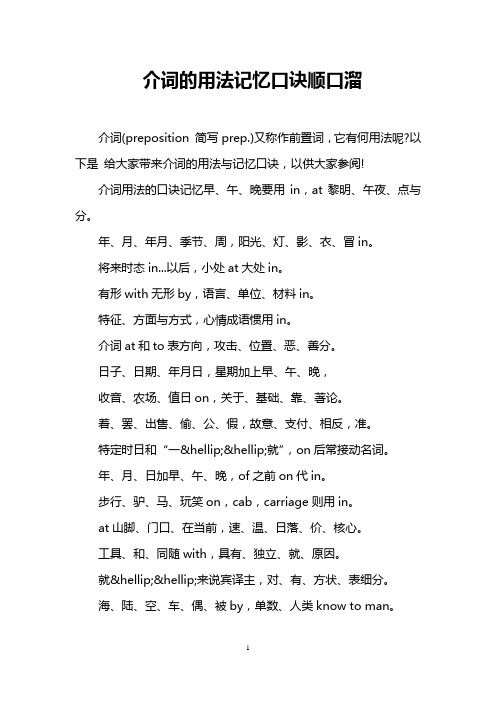
介词的用法记忆口诀顺口溜介词(preposition 简写prep.)又称作前置词,它有何用法呢?以下是给大家带来介词的用法与记忆口诀,以供大家参阅!介词用法的口诀记忆早、午、晚要用in,at黎明、午夜、点与分。
年、月、年月、季节、周,阳光、灯、影、衣、冒in。
将来时态in...以后,小处at大处in。
有形with无形by,语言、单位、材料in。
特征、方面与方式,心情成语惯用in。
介词at和to表方向,攻击、位置、恶、善分。
日子、日期、年月日,星期加上早、午、晚,收音、农场、值日on,关于、基础、靠、著论。
着、罢、出售、偷、公、假,故意、支付、相反,准。
特定时日和“一……就”,on后常接动名词。
年、月、日加早、午、晚,of之前on代in。
步行、驴、马、玩笑on,cab,carriage则用in。
at山脚、门口、在当前,速、温、日落、价、核心。
工具、和、同随with,具有、独立、就、原因。
就……来说宾译主,对、有、方状、表细分。
海、陆、空、车、偶、被by,单数、人类know to man。
this、that、tomorrow,yesterday,next、last、one。
接年、月、季、星期、周,介词省略已习惯。
over、under正上下,above、below则不然,若与数量词连用,混合使用亦无关。
‘beyond超出、无、不能,against靠着,对与反。
besides,except分内外,among之内along沿。
同类比较except,加for异类记心间。
原状because of,、owing to、due to表语形容词under后接修、建中,of、from物、化分。
before、after表一点, ago、later表一段。
before能接完成时,ago过去极有限。
since以来during间,since时态多变换。
介词的用法总结
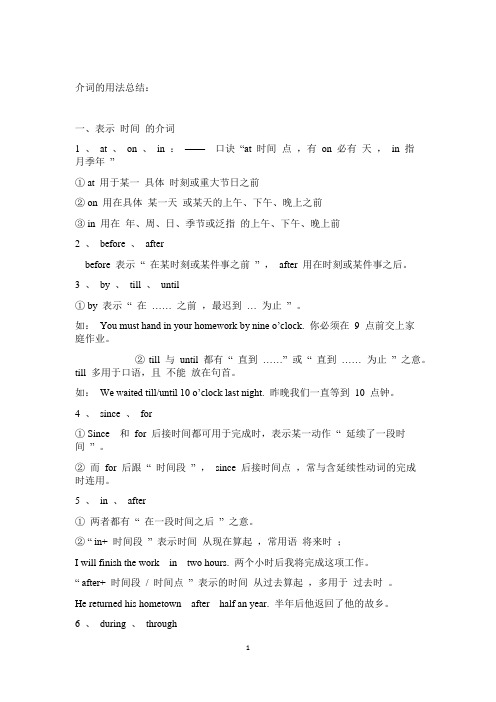
介词的用法总结:一、表示时间的介词1 、at 、on 、in :——口诀“at 时间点,有on 必有天,in 指月季年”① at 用于某一具体时刻或重大节日之前② on 用在具体某一天或某天的上午、下午、晚上之前③ in 用在年、周、日、季节或泛指的上午、下午、晚上前2 、before 、afterbefore 表示“ 在某时刻或某件事之前” ,after 用在时刻或某件事之后。
3 、by 、till 、until① by 表示“ 在…… 之前,最迟到… 为止” 。
如:You must hand in your homework by nine o’clock. 你必须在9 点前交上家庭作业。
②till 与until 都有“ 直到……” 或“ 直到…… 为止” 之意。
till 多用于口语,且不能放在句首。
如:We waited till/until 10 o’clock last night. 昨晚我们一直等到10 点钟。
4 、since 、for① Since 和for 后接时间都可用于完成时,表示某一动作“ 延续了一段时间” 。
②而for 后跟“ 时间段” ,since 后接时间点,常与含延续性动词的完成时连用。
5 、in 、after①两者都有“ 在一段时间之后” 之意。
② “ in+ 时间段” 表示时间从现在算起,常用语将来时;I will finish the work in two hours. 两个小时后我将完成这项工作。
“ after+ 时间段/ 时间点” 表示的时间从过去算起,多用于过去时。
He returned his hometown after half an year. 半年后他返回了他的故乡。
6 、during 、through① during 意为“ 在一段时间内” 的行为或状态,与一段时间的整体连用。
I made many good friends during my visit to China. 我在中国参观期间交了很多好朋友。
英语介词的用法口诀 介词分分类及用法
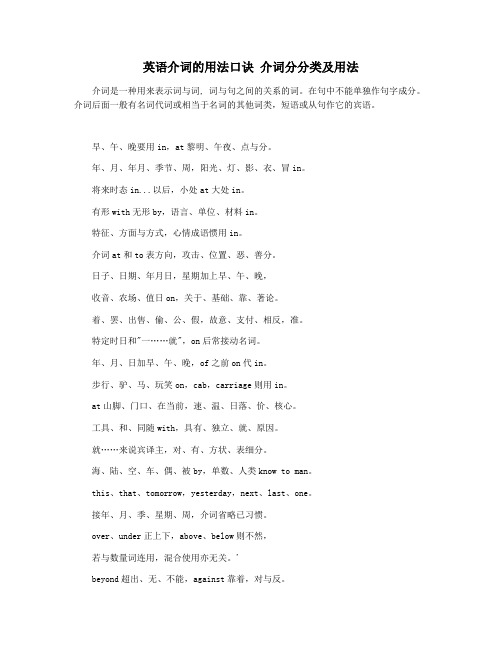
英语介词的用法口诀介词分分类及用法介词是一种用来表示词与词, 词与句之间的关系的词。
在句中不能单独作句字成分。
介词后面一般有名词代词或相当于名词的其他词类,短语或从句作它的宾语。
早、午、晚要用in,at黎明、午夜、点与分。
年、月、年月、季节、周,阳光、灯、影、衣、冒in。
将来时态in...以后,小处at大处in。
有形with无形by,语言、单位、材料in。
特征、方面与方式,心情成语惯用in。
介词at和to表方向,攻击、位置、恶、善分。
日子、日期、年月日,星期加上早、午、晚,收音、农场、值日on,关于、基础、靠、著论。
着、罢、出售、偷、公、假,故意、支付、相反,准。
特定时日和"一……就",on后常接动名词。
年、月、日加早、午、晚,of之前on代in。
步行、驴、马、玩笑on,cab,carriage则用in。
at山脚、门口、在当前,速、温、日落、价、核心。
工具、和、同随with,具有、独立、就、原因。
就……来说宾译主,对、有、方状、表细分。
海、陆、空、车、偶、被by,单数、人类know to man。
this、that、tomorrow,yesterday,next、last、one。
接年、月、季、星期、周,介词省略已习惯。
over、under正上下,above、below则不然,若与数量词连用,混合使用亦无关。
'beyond超出、无、不能,against靠着,对与反。
besides,except分内外,among之内along沿。
同类比较except,加for异类记心间。
原状because of,、 owing to、 due to表语形容词under后接修、建中,of、from物、化分。
before、after表一点, ago、later表一段。
before能接完成时,ago过去极有限。
since以来during间,since时态多变换。
与之相比beside,除了last but one。
汉语介词口诀

汉语介词口诀一、汉语介词概述汉语介词是一种虚词,主要用于表示名词、代词与其他成分之间的语法关系。
它们可分为时间介词、地点介词、方向介词、方式介词、原因介词和目的介词等。
介词与动词、形容词、副词等实词相结合,可以构成介词短语,表示特定的语法意义。
二、常见介词分类与用法1.时间介词时间介词主要用于表示时间状语,如:在、于、从、到、自从、截至等。
例如:- 我明天要去开会。
(在+明天)- 自从来了新经理,公司业绩越来越好。
(自从+来)2.地点介词地点介词表示名词、代词所在的位置,如:在、上、下、里、外、附近等。
例如:- 书在桌子上。
(在+桌子上)- 超市离家不远。
(不远+家)3.方向介词方向介词表示方向或动作的趋向,如:向、朝、往、背、离开等。
例如:- 他朝着窗户走去。
(朝着+窗户)- 离开市区,我们来到了乡下。
(离开+市区)4.方式介词方式介词表示动作的方式或手段,如:用、靠、乘、沿、通过等。
例如:- 我靠走路去上班。
(靠+走路)- 他们乘船游览了长江。
(乘+船)5.原因介词原因介词表示动作的原因,如:因为、由于、凭、靠等。
例如:- 因为他生病了,所以没来。
(因为+生病)- 老师表扬了她,因为她勤奋好学。
(因为+勤奋好学)6.目的介词目的介词表示动作的目的,如:为了、为、以便、好等。
例如:- 他努力学习,为了考上好大学。
(为了+考上好大学)- 我帮你忙,以便你顺利完成任务。
(以便+顺利完成任务)三、介词辨析与应用技巧在实际应用中,不同介词之间有时容易混淆。
为避免误用,我们需掌握它们之间的细微差别。
如:- “在”与“于”:二者都表示位置,但“在”强调存在或位于某个地方,而“于”强调动作发生的时间或地点。
- “从”与“由”:二者都表示起点,但“从”强调起点和终点的相对关系,而“由”强调动作的来源或途径。
四、实战演练与练习为了更好地掌握汉语介词的用法,请完成以下练习:1.用适当的时间介词填空:- 我________(明天)去公园散步。
语文介词的用法和位置口诀

语文介词的用法和位置口诀一、介词的概念及基本用法介词是语言中常用的一种虚词,用来引导名词短语或代词短语与其他成分之间的关系。
介词通常在句子中充当修饰、补充、限制或指示等作用。
在汉语中,介词的使用非常广泛,掌握好介词的用法和位置对于正确理解和运用语言至关重要。
二、常见介词及其使用场景1. 位置类介词:在、下、上、前、后等这类介词主要表示物体所处的具体位置或方向。
例如:“书放在桌子上。
”“他站在门口等我。
”需要注意的是,这些位置类介词往往与动作动词连用,表达一个行为发生在某个特定的地点。
2. 时间类介词:从、到、在、以后等时间类介词主要表示时间段或事件发生的时间顺序。
例如:“从早上到晚上,他都在学习。
”“我们可以聚会之后去看电影。
”这些介词往往与表示时间和动作的短语连用,并起到连接两者关系的作用。
3. 方式类介词:以、为、凭借等方式类介词主要表示行动的方式或手段。
比如:“以他的聪明才智,他一定会成功。
”“我凭借努力取得了好成绩。
”这些介词通常来跟一个名词或动名词连用,表示通过什么方式或手段实现某种行为。
4. 条件类介词:如果、只要、无论等条件类介词主要表示某种条件下会发生的结果。
例如:“如果你考试不及格,就得重新考。
”“无论外面多冷,只要我们有爱心就不怕。
”这些介词往往与条件状语从句连用,表达某个条件下可能出现的情况。
5. 归属类介词:关于、属于、拥有等归属类介词主要表示某物所具有的特性或者是属于谁的。
例如:“这本书关于历史知识。
”“房子属于我父母所有。
”这些介词通常与名词短语连用,并说明其所具有的特定属性。
三、介词位置口诀为了更好地掌握和运用介词,我们可以记住以下简单易懂的口诀:前高后起向后看,命脉与其内外移。
此前须随名悠转,那后字面齐整漂。
例行出入同在后,条件陪伴前头翘。
方式如圈尊之化,所有解放属心调。
这个口诀的意思是:1. 前高后起:介词通常位于名词短语或代词短语之前,例如“在房子里”、“对他来说”。
语文介词的用法总结

语文介词的用法总结
1. 哎呀呀,你知道吗,介词“在”那可是用处多多啊!比如说“我在学校”,它就明确了我所处的位置呢。
2. 嘿,“从”这个介词也很有意思呀!像“他从家里出来”,就表明了他出发的起点呢。
3. 哇哦,“到”字也不能小瞧呀!“我到北京了”,一下子就让人清楚我抵达的地方了,对吧?
4. 咳咳,“于”也有它的妙处哟!“他出生于 1990 年”,这样时间就清晰啦。
5. 哟呵,“对”这个介词也很重要哦!“他对我很好”,表现出了一种关系呢。
6. 嘿呀,“向”也有大作用呀!“他向我走来”,明确了动作的方向,这不是很神奇吗?
7. 哇塞,“为”也是很关键的呀!“他为我做了很多事”,表现出了目的或者对象呢。
8. 哎呀,“跟”也不容错过呀!“我跟他一起玩”,体现了和谁一起呢。
9. 嘿嘿,“自”也得说一说呀!“他自小就很聪明”,交代了开始的时间点呢。
我的观点结论就是:语文介词的用法真的丰富多样且非常重要,掌握了它们可以让我们的表达更准确、更生动呀!。
介词用法
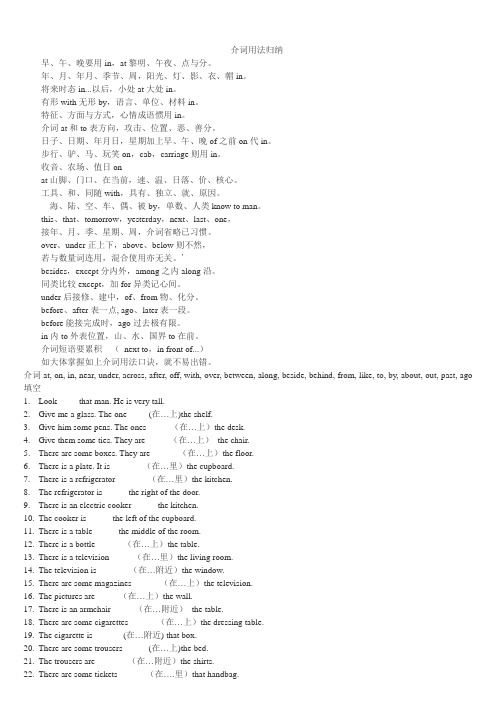
介词用法归纳早、午、晚要用in,at黎明、午夜、点与分。
年、月、年月、季节、周,阳光、灯、影、衣、帽in。
将来时态in...以后,小处at大处in。
有形with无形by,语言、单位、材料in。
特征、方面与方式,心情成语惯用in。
介词at和to表方向,攻击、位置、恶、善分。
日子、日期、年月日,星期加上早、午、晚of之前on代in。
步行、驴、马、玩笑on,cab,carriage则用in。
收音、农场、值日onat山脚、门口、在当前,速、温、日落、价、核心。
工具、和、同随with,具有、独立、就、原因。
海、陆、空、车、偶、被by,单数、人类know to man。
this、that、tomorrow,yesterday,next、last、one,接年、月、季、星期、周,介词省略已习惯。
over、under正上下,above、below则不然,若与数量词连用,混合使用亦无关。
’besides,except分内外,among之内along沿。
同类比较except,加for异类记心间。
under后接修、建中,of、from物、化分。
before、after表一点, ago、later表一段。
before能接完成时,ago过去极有限。
in内to外表位置,山、水、国界to在前。
介词短语要累积(next to,in front of...)如大体掌握如上介词用法口诀,就不易出错。
介词at, on, in, near, under, across, after, off, with, over, between, along, beside, behind, from, like, to, by, about, out, past, ago 填空1.Look ____ that man. He is very tall.2.Give me a glass. The one ____ (在…上)the shelf.3.Give him some pens. The ones _____(在…上)the desk.4.Give them some ties. They are _____(在…上)the chair.5.There are some boxes. They are _____ (在…上)the floor.6.There is a plate. It is ______ (在…里)the cupboard.7.There is a refrigerator ______ (在…里)the kitchen.8.The refrigerator is _____ the right of the door.9.There is an electric cooker _____ the kitchen.10.The cooker is _____ the left of the cupboard.11.There is a table _____ the middle of the room.12.There is a bottle _____ (在…上)the table.13.There is a television ____ (在…里)the living room.14.The television is ______ (在…附近)the window.15.There are some magazines _____ (在…上)the television.16.The pictures are ____ (在…上)the wall.17.There is an armchair _____(在…附近)the table.18.There are some cigarettes _____ (在…上)the dressing table.19.The cigarette is ______ (在…附近) that box.20.There are some trousers _____ (在…上)the bed.21.The trousers are ______ (在…附近)the shirts.22.There are some tickets _____ (在….里)that handbag.23.Don’t stand there. Come _____, please. (请进)24.Put these clothes ______ (在…里)the wardrobe.25.Sally is ____ the garden.(在…里)26.She is sitting ______ the tree.(在…下)27.The dog is running ______ the grass.(穿过)28.The dog is running ______ a cat. (在…后面)29.My sister is looking ______ a picture.30.He is turning _____ the light. (打开)31.The girl is turning ______ the tap. (关掉)32.The boy is putting ______ his shirt. (穿上)33.Mrs. Jones is taking _____ her coat. (脱下)34.There are some clouds _____ the sky.35.Mr. Jones is ______ his family. (和….一起)36.They are walking ______ the bridge.(穿过)37.There are some boats _____ the river.38.The ship is going _____ the bridge.(在…下)39.The aeroplane is flying _____ the river. (在…上)40.Our village is _____ a valley. (在…里)41.The village is _______ two hills. (在…中间)42.My wife and I are walking ______ the banks of the river. (沿着)43.There is a boy ______ the water. (在…里)44.He is swimming ______ the river. (穿过)45.The school is ______ a park. (在…旁边)46.They are walking ______ the street. (穿过)47.The cat is running ______ the wall. (沿着)48.They are jumping _____ the tree. (下来)49.The man is walking _______ two policemen. (在…中间)50.What are you going to do _____ that vase? (处理)51.I’m going to put the vase _____ the table.(在…上)52.He is going to put it _____ front of the window.53.Is there any water ______ this kettle?54.The tea is _______ the teapot. (在…后面)55.There is a man sitting ________ you. (在…后面)56.There are some cars _____ front of that building.57.I can’t put my coat _____.58.The little girl can’t jump _____ the wall. (跳下)59.I don’t like milk _____ my coffee.60.The gilr is sitting ________ her mother and her father.61.The teacher is standing _____ front of the whiteboard.62.The whiteboard is _______ the teacher. (在…后面)63.Where do you come _______?64.I come _______ Greece.65.What’s th e weather ________ in your country?66.What’s the weather like _____ spring?67.It’s often windy _____ March.68.It’s often cold ______ November.69.The weather is often cold _____ the North and windy _____ the East.70.The Sawyers live ____ 87 King Street.71.____ the morning, Mr. Sawyer goes ____ work and the children go ___ school.72.Their father takes them _____ school every day.73.Mrs. Sawyer stays _____ home every day.74.She always eats her lunch ______ noon.75._____the afternoon, she usually sees her friends.76._____ the evening, the children come home _____ school.77.Mr. Sawyer comes home _______ work.78.______ night, the children always do their homework. Then they go ___ bed.79.The children go _____ school ____ car every day.80.Today, they are going ____ school ____ foot.81.Mrs. Sawyer usually stays ____ home ____ the morning.82.____ the afternoon, Mrs. Sawyer usually drinks tea ____ the living room.83.____ the moment, they are playing ____ the garden.84.Mr. Sawyer usually reads his newspaper_____night. But he’s reading an interesting book ____ the moment.85.He usually shaves ____ seven o’clock every day.86.Tom is ____ bed now.87.What’s the matter ______ him?88.Tom must stay _____ bed for a week.89.It’s 7 o’clock now. You must get _____.90.He can get ____ for ______ (大约)hours each day.91.You mustn’t play ______ matches.92.You mustn’t lean _____ of the window.93.You must be home _____ half ______ten.94.Can I get the key _____ the front door, please?95.You mustn’t come home _____ a quarter past eleven.(在…之后)96.I’m going to see him _____ ten o’clock.97.It often rains ______ November.98.Where are you ______? I am ______ Frence.99.I always go to work _____ the morning.100.Were you _____ the butcher’s?101.I was _____ the greengrocer’s.102.Was he absent _______ school last week?103.He was absent ______ Monday, Tuesday, Wednesday and Thursday.104.We’re going to spend three days ______ the country.105.There is a car race _____ our hometown every year.(在…附近)106._____ 1995, there was a very big race.107.My wife and I are ____ the race.108.You can see us ____ the crowd.109.We are standing ______ the left.110.Five other cars were just ______ him. (在…后面)111._____ the way home, my wife lost her wallet.112.What’s Ron Marston ______, Pauline?113.He telephoned me the day _________ yesterday. (前天) 114.She saw a man ______ a bus stop. (在…附近)115.Can you tell me the way _____ King Street, please?116.He put his hand into his pocket and took _____ a phrasebook. 117.Do you have any shoes ______ this?118.She bought them _____ the U.S.119.We had some shoes like those a month ______. (以前) 120.They are not _____ fashion this year.121.Can you come ____ 10 a.m. ____ Monday, April 24th? 122.Let me have a look ____ it.123._____ tell you the truth, you need a new car.124.I met her two weeks ______. (以前)125.I believe that the house is ______ sale.126.I lived here ______ twenty years.127.I’ve been here ______ 1976.(自从)128.They’ll move in the day _____ t omorrow. (后天)129.I left a suitcase _____ the train _____ London.。
语文介词用法口诀

语文介词用法口诀
口诀:
自、从、以、当、为、按照,
由于、对于、为了、到
和、跟、把、比、在、关于
除了、同、对、向、往、朝。
用法:用在名词、代词前,组成介宾短语后,修饰、补充“动”“形”要记牢。
说明:介绍的分类不同专家有不同的分法,但大都大同小异。
参看另一种分法①施受介词
施受介词用于引出施事者或受事者。
施受介词主要包括:
把被叫让给由将归管
例如:
一道闪电把整个窗户都照亮了。
(引出受事)
她双脚跳起把流氓臭骂了一通。
(引出受事)
政府还给我们募集了一百件棉袄,二百条棉裤。
(引出受事)
②方式介词
方式介词用于引出动作的方式、方法、工具等。
方式介词主要包括:用以凭靠按据拿按照遵照依照根据通过本着例如:
我们的生活要靠劳动,不能单靠政府救济。
他常以一种欣赏的心态看着孩子们做游戏。
介词使用方法归纳
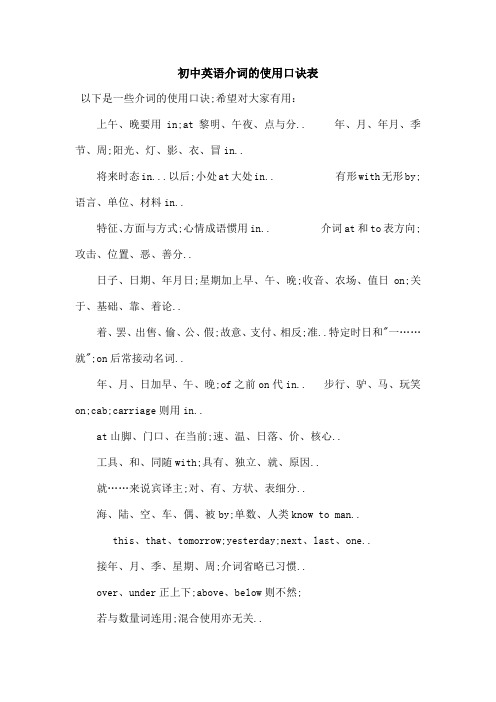
初中英语介词的使用口诀表以下是一些介词的使用口诀;希望对大家有用:上午、晚要用in;at黎明、午夜、点与分.. 年、月、年月、季节、周;阳光、灯、影、衣、冒in..将来时态in...以后;小处at大处in.. 有形with无形by;语言、单位、材料in..特征、方面与方式;心情成语惯用in.. 介词at和to表方向;攻击、位置、恶、善分..日子、日期、年月日;星期加上早、午、晚;收音、农场、值日on;关于、基础、靠、着论..着、罢、出售、偷、公、假;故意、支付、相反;准..特定时日和"一……就";on后常接动名词..年、月、日加早、午、晚;of之前on代in.. 步行、驴、马、玩笑on;cab;carriage则用in..at山脚、门口、在当前;速、温、日落、价、核心..工具、和、同随with;具有、独立、就、原因..就……来说宾译主;对、有、方状、表细分..海、陆、空、车、偶、被by;单数、人类know to man..this、that、tomorrow;yesterday;next、last、one..接年、月、季、星期、周;介词省略已习惯..over、under正上下;above、below则不然;若与数量词连用;混合使用亦无关..beyond超出、无、不能;against靠着;对与反..besides;except分内外;among之内along沿..同类比较except;加for异类记心间..原状because of;、 owing to、 due to表语形容词under后接修、建中;of、from物、化分..before、after表一点; ago、later表一段..before能接完成时;ago过去极有限..since以来during间;since时态多变换..与之相比beside;除了last but one..复不定for、找、价、原;对、给、段、去、为、作、赞..快到、对、向towards;工、学、军、城、北、上、南..but for否定用虚拟;复合介词待后言..ing型由于鉴;除了除外与包合..之后、关于、在......方面;有关介词须记全..in内to外;表位置;山、水、国界to在前..1.表示时间;注意以下用法:1 表示时间的某一点、某一时刻或年龄等用 at..如:I get up at six in the morning. 我早上六点钟起床.. He got married at the age of 25. 他 25 岁结婚..2 泛指一般意义的上午、下午或晚上以及月或年等较长的时间;一般用 in..如:We watch TV in the evening. 我们晚上看电视.. He went to Japan in 1946. 他于 1946 去了日本..3 若表示星期几或某一特定的日期;则用 on..如:He left here on the fifth of May. 他于 5 月 5 日离开这儿..2.表示地点、场所、位置等;注意以下用法:1 表示某一点位置;用 at..如:We live at No 87 Beijing Road. 我们住在北京路 87 号..The hospital is at the end of the street. 医院在这条街的尽头..与名词所有格连用表示地点;也用 at..如:at my sister’s 在我姐姐家at the doctor’s 在医务室2 表示空间或范围;用 in..如:What’s in the box 这盒子里有什么He lives in Paris with his wife. 他同他妻子住在巴黎..但有时两者可换用..如:The meeting was held at in the hotel. 会议在宾馆举行..3 at 与 in 的另一个区别是:at 用于指较小的地方;而 in 用于指较大的地方..如:in Shanghai 在上海 at the station 在车站但是;大与小是相对的;有时随着说话者的着眼点不同;大地方也可能用 at比如把一个大地方看作一个点时..如:Our plane refuelled at London. 我们的飞机在伦敦加油..We stopped for an hour at Moscow on our way to Paris. 我们在去巴黎的途中在莫斯科停了 1 个小时..4 介词 on 用于地点;主要指在某物的表面..如:What’s on the table 桌上有什么There’s a wallet lying on the ground. 地上有个钱包..注:在少数搭配中;也用介词 on..如:He works on a farm. 他在农场工作..3.在某些搭配中;三者的区别与英国英语和美国英语有关:in the street 英 / on the street 美在街上in the road 英 / on the road 美在路上in the team 英 / on the team 美在这个队at the weekend 英 / on the weekend 美在周末at weekends 英 / on weekends 美在周末4.有时三者的差别与搭配习惯和用法有关:in bed / on the bed 在床上fromin the tree 多指树外之物 / on the tree 多指树本身之物在树上英语基础语法·介词1. 介词的定义介词是一种用来表示词与词; 或者词与句之间的关系的词;在句中不能单独作句成分..介词一定要有宾语;充当宾语的一般有名词、代词或相当于名词的其它词、短语或句子;短语或从句..2. 介词的种类1简单介词;如at; in off; on; by; to; with等..2合成介词;如into; inside; within; throughout等..3短语介词;如according to; because of; in addition to; in front of; in spite of等..4二重介词;如from behind; from among; until after; at about 等..3. 介词的宾语1名词:Let’s go for a walk along the river.咱们到江边散散步..2代词:He’s standing in front of me.我站在我前面..3形容词:Her pronunciation is far from prefect.她的语音远不是完美的..注:有的形容词前可看作是省略了being..4动名词:He’s good at drawing.他善长绘画..5过去分词:I took it for granted that she was for England.我还以为她是英国的..注:过去分词作介词宾语只限于take…for granted结构和用于regard…as后..6不定式:I had no choice but to lie down.除了躺下外我别无选择..She did nothing but cry.她只是哭..注:介词后通常是不能用不定式作宾语的;只有表示“除……外”的but; except等个别介词能接不定式作宾语..前面有行为动词do时;不定式不用to;否则要带to..7疑问词+不定式:I don’t know how to improve my English.我不知道如何提高我的英语水平..8副词:I didn’t know it until recently.直到最近我才知道此事..9数词:He was among the first to arrive.他是第一批到的..10介词短语:She won’t go home until after the exam.她要考完试之后再回家..11从句:Think of what I said. 想想我说的话from ..I’m worried about where he is. 我担心他上哪儿去了..I have doubts about whether不用if he is the best man for the job. 我怀疑他是否做这项工作的最好人选..He has no special fault except that he smokes too much.他除了抽烟太多之外;没有什么特别的毛病..注:除except that; in that等后可接that从句外;通常只接连接代词、连接副词及whether引导的从句;也不接if引导的从句..4. 介词短语的作用介词和它的宾语构成介词词组;其用法如下:1作定语:The girl in red is my sister.穿红衣的那个女孩是我妹妹..注:介词短语作定语总是放在它所修饰的名词后面..2作状语:Can you say it in English 这个你会用英语说吗3作表语:He’s in the office.他在办公室..4作补语:I always find her at her studies.我经常发现她在学习..5作介词宾语:I saw her from across the street.我从街对面望见了她..关于介词的宾语介词的宾语通常是名词或代词;若需动词作宾语;则通常用动名词形式..但是以下几种情况比较特殊;考生需注意:1.表示“除了”的介词 but; except 后接动词作宾语;通常用不定式;若其前有do;则不定式不带to;若其前没有do;则不定式通常带to..如:He wanted nothing but to stay there. 他只是想留在那里..I’ve done everything you wanted except cook the meals. 你要我干的事我全干了;只是还没做饭..2.介词可接what从句作宾语;但通常不接that从句作宾语;遇此情况;应先在介词后加上 the fact..如:No one paid attention to what he said. 没人注意他说的话..No one paid attention to the fact that he was poor. 没人注意他很穷..注:表示“除了”的except 后可接that从句..如:He has no special fault except that he smokes too much. 他除了抽烟太多之外;没有什么特别的毛病..3.在某些特殊结构中;形容词、副词、分词、介词短语等可用作介词宾语..如:It’s too hot in here. 这里面太热了..The cat jumped out from under the bed. 猫从床下跳出来..Her pronunciation is far from perfect. 她的语音远不是完美的..I can’t regard the matter as settled. 我不能认为这事已经解决..一、介词按其构成可分为:1. 简单介词 at; in; on; to; since; until等..如:He's worked there since 1998.2. 复合介词 into; onto; out of等..如:She is out of school. 她毕业了..3. 二重介词 from under; from behind; from out of; until after; except in等..如:I'm from out of town. 我是从城外来的..4. 短语介词 because of; instead of; in spite of等..如:I went back not because of the rain; but because I was tired.我回去不是因为下雨;而是因为我累了..二、介词的作用:1. 表示地点: after; along; at; below; by; of; near; over; through; under等..如:Near the village the boys are skating on the ice. 男孩子们正在村子附近的冰上滑冰..They lay down under the shade of a tree. 他们躺在一棵树的树阴下..2. 表示时间: about; after; across; at; during; for; in; of; till; until等..如:After class he will tell us about the accident. 课后他将告诉我们有关事故的情况..A heavy rain has been falling across three days. 一场大雨下了整整三天..The accident happened during the night. 事故发生在夜间..3. 表示动作: at; across; around; on; over; under等..如:The earth goes around the sun. 地球绕太阳运行..4.表示比较: as; like; above; over; with等..如:She was something like her sister.5. 表示原因: about; for; from; with等..如:Don't worry about my lessons. 不要担心我的功课..6. 表示条件: to; with; without等..如:Without your advice; he would have failed.7. 表示手段、方式: as; by; in; with等..如:He behaved asa drunkard. 他的举止如同醉汉一样..8. 表示距离、数量: from; in; within等..如:My house is ten miles from the school. They were thirty in all. 他们总共有三十人..9. 表示目的: as; for等..如:I only said it as a joke. 我只是把它当作笑话讲的..10. 表示让步: for; with等..如:For all his effort; he didn't succeed.for还可以引导插入语;例如:I; for one; shall vote against the proposal. 我也投票反对这个提议2.介词后常用人称代词宾格和动词-ing形式1 You must take good care of her.2 Thank you for teaching us so well.3.几组易混淆的介词A.“在...之后”in +一段时间用于一般将来时after +一段时间用于一般过去时after +一点时间常用于一般将来时如:The baby stopped crying after half an hour. The baby will stop crying in half an hour.They will visit their teacher after Friday.B.for +一段时间since +过去的一点时间这两者均用于现在完成时;具体在时态部分;我会继续向们讲解..C.be made of "用……制成" be made in“由某地制造”be made by somebody“由某人制成” D.in;on;at表时间in表示“在某月季节、年等”如:in 1996; in January; in summer固定词组:in the morning; in a week;in a minute;in time; in the endon用于指具体的某一天或专指某一天上午、下午或晚上等..如:on Christmas Day; on the night of February 16at用于具体时刻前和某些固定词组中..固定词组:at seven; at the moment; at night; at last; at first; at noon; at times; at once; at this time of the year; at the beginning of; at the end of this month; at the same time..注意:在表时间里;下列情况下一般不用介词..词组里有:next; last; this; that; tomorrow; yesterday; one; every; all以及the day before yesterday和the day after tomorrow前不用介词..如:不能说in tomorrow ;只能说tomorrow在明天E. except +宾格/doing something "除…之外”不包括本身Everyone is at school today except Lin Tao. 同义句转换=Only Lin Tao isn't at school today.F.“用”交通工具by plane 用语言in English 通过媒介on/over the telephone; on /over the radio; on TV 用工具手段with a pen; with one's handsG.between“在~和~两者之间”between...and...;between the two... among在...之间三者或三者以上介词练习。
- 1、下载文档前请自行甄别文档内容的完整性,平台不提供额外的编辑、内容补充、找答案等附加服务。
- 2、"仅部分预览"的文档,不可在线预览部分如存在完整性等问题,可反馈申请退款(可完整预览的文档不适用该条件!)。
- 3、如文档侵犯您的权益,请联系客服反馈,我们会尽快为您处理(人工客服工作时间:9:00-18:30)。
介词用法口诀早、午、晚要用in,at黎明、午夜、点与分。
年、月、年月、季节、周,阳光、灯、影、衣、冒in。
将来时态in...以后,小处at大处in。
有形with无形by,语言、单位、材料in。
特征、方面与方式,心情成语惯用in。
介词at和to表方向,攻击、位置、恶、善分。
日子、日期、年月日,星期加上早、午、晚,收音、农场、值日on,关于、基础、靠、著论。
着、罢、出售、偷、公、假,故意、支付、相反,准。
特定时日和"一……就",on后常接动名词。
年、月、日加早、午、晚,of之前on代in。
步行、驴、马、玩笑on,cab,carriage则用in。
at山脚、门口、在当前,速、温、日落、价、核心。
工具、和、同随with,具有、独立、就、原因。
就……来说宾译主,对、有、方状、表细分。
海、陆、空、车、偶、被by,单数、人类know to man。
this、that、tomorrow,yesterday,next、last、one。
接年、月、季、星期、周,介词省略已习惯。
over、under正上下,above、below则不然,若与数量词连用,混合使用亦无关。
'beyond超出、无、不能,against靠着,对与反。
besides,except分内外,among之内along沿。
同类比较except,加for异类记心间。
原状because of,、owing to、due to表语形容词under后接修、建中,of、from物、化分。
before、after表一点, ago、later表一段。
before能接完成时,ago过去极有限。
since以来during间,since时态多变换。
与之相比beside,除了last but one。
复不定for、找、价、原,对、给、段、去、为、作、赞。
快到、对、向towards,工、学、军、城、北、上、南。
but for否定用虚拟,复合介词待后言。
ing型由于鉴,除了除外与包合。
之后、关于、在......方面,有关介词须记全。
in内to外表位置,山、水、国界to在前。
介词是一种用来表示词与词、词与句之间的关系的虚词,在句中不能单独作句子成分。
介词后面一般有名词代词或相当于名词的其他词类,短语或从句作它的宾语。
介词和它的宾语构成介词词组,在句中作状语,表语,补语或介词宾语。
介词可以分为时间介词、地点介词、方式介词、原因介词和其他介词,一、概念:介词是英语中最活跃的词类之一,特别是一些常用介词的搭配力特别强,可以用来表示各种不同的意思。
英语里大部分习语都是由介词和其他词构成的。
介词在句中一般不重读。
在定语从句“介词+who/which”的结构中,不能用that 代替who/which。
She is a good student from who we sh ould learn.二.相关知识点精讲介词口诀:自从以当为按照,由于对于为了到;和跟把比在关于,除了同对向往朝;用在副词动词前,修饰动副要记牢。
.1.表示地点位置的介词1)at ,in, on, to,forat (1)表示在小地方; (2)表示“在……附近,旁边”in (1)表示在大地方; (2)表示“在…范围之内”。
on 表示毗邻,接壤,“在……上面”。
to 表示在……范围外,不强调是否接壤;或“到……”2)above, over, on 在……上above 指在……上方,不强调是否垂直,与below相对;over指垂直的上方,与under相对,但over与物体有一定的空间,不直接接触。
on表示某物体上面并与之接触。
The bird is flying above my head.There is a bridge over the river.He put his watch on the desk.3)below, under 在……下面under表示在…正下方below表示在……下,不一定在正下方There is a cat under the table.Please write your name below the line.4)in front [frant]of, in the front of在……前面in front of…意思是“在……前面”,指甲物在乙物之前,两者互不包括;其反义词是behind(在……的后面)。
There are some flowers in front of the house.(房子前面有些花卉。
)in the front of 意思是“在…..的前部”,即甲物在乙物的内部.反义词是at the back of…(在……范围内的后部)。
There is a blackboard in the front of our classroom.我们的教室前边有一块黑板。
Our teacher stands in the front of the classroom.我们的老师站在教室前.(老师在教室里)5)beside,behindbeside 表示在……旁边behind 表示在……后面2.表示时间的介词1)in , on,at 在……时in表示较长时间,如世纪、朝代、时代、年、季节、月及一般(非特指)的早、中、晚等。
如in the 20th century, in the 1950s, in 1989, in summer, in J anuary, in the morning, in one’s life , in one’s thirties等。
on表示具体某一天及其早、中、晚。
如on May 1st, on Monday, on New Year’s Day, on a cold nigh t in January, on a fine morning, on Sunday afternoon等。
at表示某一时刻或较短暂的时间,或泛指圣诞节,复活节等。
如at 3:20, at this time of year, at the beginning of, at the end of …, at the age of …, at Christmas,at night, at noon, at this moment等。
注意:在last, next, this, that, some, every 等词之前一律不用介词。
如:We meet every day.2)in, after 在……之后“in +段时间”表示将来的一段时间以后;“after+段时间”表示过去的一段时间以后;“after+将来的时间点”表示将来的某一时刻以后。
3)from, since 自从……from仅说明什么时候开始,不说明某动作或情况持续多久;since表示某动作或情况持续至说话时刻,通常与完成时连用。
since 表示"自(某具体时间)以来",常用作完成时态谓语的时间状语。
since liberation(1980)自从解放(1980年)以来They have bee n close friends since childhood.他们从小就是好朋友。
(1)since the war是指"自从战争结束以来",若指"自从战争开始以来",须说"sincethe beginning of the war"。
(2)不要将since与after混淆。
比较:He has worked here since 1965.(指一段时间,强调时间段)自从1965年以来,他一直在这儿工作。
He began to work here after 1965.(指一点时间,强调时间点)从1965年以后,他开始在这儿工作。
4)after, behind 在……之后after主要用于表示时间;behind主要用于表示位置。
时间名词前介词用法口诀年前周前要用in具体日子却要用on遇到几号要用on上午下午又是in要说某日上下午用on换in记清楚午夜黄昏用at黎明用它也不错at用在时分前说“差”可要用上to说"过''要用past3.表示运动方向的介词:across, through 通过,穿过across表示横过,即从物体表面通过,与on有关,为二维through穿过,即从物体内部穿过,与in有关,为三维。
4.表示“在……之间”的介词:表示“在……之间”的介词在英语中属于方位介词,如in front of ,be hind ,on,in,near,under,upbetween, amongbetween指在两个人或两个事物之间;among指在三个或三个以上的人或事物之间。
5.表示其他意义的介词1)on ,about 关于on 表示这本书,这篇文章或演说是严肃的,或学术性的,可供专门研究这一问题的人阅读;about表示内容较为普通,不那么正式。
2)by, with, in 表示方法、手段、工具by 以……方法、手段或泛指某种交通工具;with 表示用…工具、手段,一般接具体的工具和手段;in 表示用…方式,用…语言(语调、笔墨、颜色)等;3)except, besides 除了except 除……之外,不包括在内;besides 除……之外,包括在内。
Except for Mr. Wang, we went to see the film.(王先生没去)Besides Mr. Wang, we also went to see the film.(王先生也去了)三.巩固练习1. Taiwan is _______ the southeast of China.(in, on, to)2. Go ____on_____ the bridge ___to______ the river, you’ll find the shop.(across, through; over, above)3. I go to school ______at____7:30 every morning.(in, on, at)4. He would like to meet her ______at____8:00 and 9:00 tomo rrow morning.(between, among )5. The Greens have lived in China _____for___ three years.(i n, for, after)6. We go to school every day ___on_____ Saturday and Sund ay.(except, besides)7. He wrote the letter _________ ink.(by, with ,in)8. She returned to her country _____for____five years.(in, afte r, for)9. There is a big tree _________ our classroom.(after, behind)10. I usually go to work _________ bike.(by, on, with)1. There’s something _______ her that I really don’t like.A. withB. forC. toD. about2. I was angry _______ him for keeping me waiting.A. withB. toC. aboutD. on3. _______ going to French evening classes twice a week she does yoga on Wednesdays.A. Because ofB. ExceptC. BesidesD. But for4. _______ cooking, writing and running the farm, she was ver y busy.A. AmongB. BetweenC. OverD. As5. _______ one old lady, the bus was empty.A. ExceptB. Except forC. ButD. Besides6. They promise that the work would all be finished _______ n ext week.A. untilB. inC. byD. to7. We didn’t live together. We kept in touch _______ writing of ten.A. withB. ofC. onD. by8. It was very kind of her. She insisted _______ her car to us.A. to lendB. lendingC. on lendingD. in lending9. We’ve talked a lot _______ cars. What about trains?A. ofB. withC. aboutD. in10. “How long have you been here?” “_______ the end of last month.”A. InB. ByC. AtD. Since11. The chemistry teacher required the students _______ more attention _______ the lab clean.A. to pay, to keepB. to paying, to keepingC. to pay, to keepi ngD. paying, keeping12. “Is your car equal _______ hers in speed?” “No, mine is f aster. But my old one equals _______ hers in speed."A. to, toB. \, \C. to, \D. \, to13. This exam is very important for her. She won’t go home _ _____ the exam.A. until afterB. after untilC. untilD. from14. This suit fits me well _______ the trousers are too long.A. onlyB. except forC. except thatD. except15. After a quick dinner, they set off ______ car and made __ ____ the nearest town.A. by, toB. in, toC. by, forD. in, for其它常用介词介词在英语词汇中所占比例很小,但它们的用法却非常灵活,复杂。
